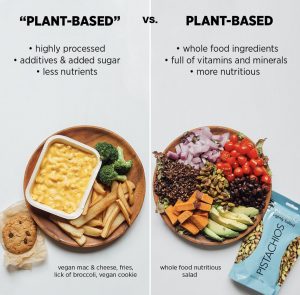Everything About Healthy Food: Benefits of Taking On Plant Based Options
The discussion bordering plant-based diet regimens has gained substantial focus over the last few years. Lots of individuals are exploring the potential wellness benefits, nutritional benefits, and environmental impacts connected with these nutritional options. As people end up being more mindful of their food's impact on wellness and sustainability, questions emerge regarding the practicalities of embracing such a lifestyle. What details modifications can one expect, and just how might these choices improve not only individual health and wellness but additionally the planet's future?
Recognizing Plant-Based Diet Plans
Several people link plant-based diets generally with vegetarianism or veganism, these diets can include a wide variety of consuming patterns that prioritize whole, minimally refined plant foods. Such diets usually include fruits, veggies, entire grains, beans, seeds, and nuts, while getting rid of or restricting animal items. This adaptability allows individuals to customize their nutritional choices according to nutritional demands and individual preferences. Some might take on a mainly plant-based diet plan while still periodically consuming meat or dairy, typically described as a flexitarian approach. The focus remains on integrating even more plant foods, which can bring about a varied range of dishes and tastes. Recognizing these various interpretations of plant-based eating is necessary for valuing its ease of access and charm in contemporary food culture.
Health And Wellness Conveniences of Plant-Based Foods
The wellness advantages of plant-based foods are substantial, offering a nutrient thickness benefit that sustains total health. Study suggests that these foods can enhance heart wellness and play an essential role in effective weight management. By including more plant-based options, people might improve their dietary options and promote long-term health.
Nutrient Thickness Benefit
Nutrient density plays a vital role in the health advantages of plant-based foods, making them an engaging selection for those seeking a well balanced diet plan. Plant-based foods, such as fruits, vegetables, vegetables, nuts, and whole grains, are commonly abundant in important vitamins, minerals, and antioxidants while being reduced in calories. This high nutrient density allows people to take in fewer calories while still meeting their dietary requirements. Additionally, these foods are loaded with nutritional fiber, promoting digestive wellness and helping in weight management. By including nutrient-dense plant-based choices, consumers can boost their general health, sustain their immune systems, and lower the danger of chronic illness. Ultimately, the nutrient thickness of plant-based foods highlights their relevance in a health-conscious way of life.
Heart Health Enhancement

Weight Monitoring Support
Along with promoting heart wellness, a plant-based diet can considerably aid in weight administration. This dietary method stresses whole foods such as fruits, vegetables, legumes, nuts, and entire grains, which are usually lower in calories and higher in fiber compared to animal-based products. The high fiber web content assists boost satiation, lowering general calorie consumption. Plant-based diet regimens are frequently rich in essential nutrients while reduced in undesirable fats, making it much easier to keep a healthy and balanced weight. Research suggests that people that adopt a plant-based way of life have a tendency to have reduced body mass indexes (BMIs) and experience more successful weight loss contrasted to those who take in meat-heavy diet regimens. Subsequently, embracing plant-based alternatives is a tactical option for efficient weight administration
Nutritional Worth of Plant-Based Components
Plant-based active ingredients are abundant in important nutrients, providing a varied array of vitamins, minerals, and anti-oxidants that add to total wellness. A comparison of protein sources reveals that while animal items are commonly considered as superior, several plant-based alternatives provide sufficient protein and various other beneficial substances. Understanding the nutritional value of these active ingredients can aid people make educated nutritional options.
Vital Nutrients in Plants
Nutrient-rich components found in plants provide a diverse array of essential vitamins and minerals that contribute greatly to overall health. These active ingredients are abundant in vitamins A, C, and K, which support immune feature, vision, and blood clot, specifically. Additionally, plants give crucial minerals such as calcium, potassium, and magnesium, vital for heart health and wellness, muscle feature, and bone stamina. The presence of fiber in plant-based foods help digestion and promotes a healthy intestine microbiome. Antioxidants, found perfectly in vegetables and fruits, aid combat oxidative anxiety and lower inflammation. Many plant foods are low in calories yet high in nutrients, making them an excellent option for those seeking to keep a healthy weight while guaranteeing excellent nutrient intake.

Comparing Healthy Protein Resources
Protein resources differ substantially in their dietary profiles, with plant-based components providing distinct advantages. Unlike animal healthy proteins, which typically consist of saturated fats and cholesterol, plant healthy proteins often tend to be reduced in these unhealthy elements. Legumes, nuts, seeds, and whole grains are abundant in crucial amino acids, fiber, vitamins, and minerals. Lentils give high healthy protein content together with considerable iron and folate, while quinoa is a full protein, offering all 9 important amino acids. In addition, plant-based proteins are often gone along with by antioxidants and phytochemicals that sustain total health and wellness. The change to plant-based protein resources not only improves dietary intake however likewise aligns with sustainable nutritional practices, minimizing environmental effect and advertising long-term health and wellness advantages.
Environmental Effect of Plant-Based Consuming
As recognition of climate modification expands, many individuals are discovering lasting dietary options that can substantially lessen their environmental impact. Plant-based consuming has actually emerged as a considerable factor to reducing greenhouse gas emissions, which are mostly connected with animals production. The cultivation of fruits, vegetables, grains, and veggies typically requires fewer resources, such as water and land, compared to animal farming. Furthermore, plant-based diet plans can cause lowered logging, as much less land is required for grazing animals or expanding pet feed. By moving in the direction of plant-based alternatives, consumers can support biodiversity and promote much healthier communities. In general, accepting plant-based eating not only benefits personal wellness yet additionally important link stands for an essential action towards environmental sustainability and conservation efforts.
Conquering Common Misconceptions
While several people acknowledge the benefits of a plant-based diet, several misunderstandings frequently prevent them from fully welcoming this way of living. A typical belief is that plant-based diets do not have enough protein; however, numerous plant resources, such as legumes, nuts, and tofu, give adequate protein. Furthermore, some assume that this diet regimen is costly, when in reality, staples like beans, rice, and seasonal vegetables can be fairly inexpensive. An additional misconception is that plant-based consuming is excessively limiting, whereas it really provides a varied range of foods and flavors. Finally, several fret that a plant-based diet might bring about deficiencies, yet with correct planning, people can obtain all essential nutrients, including minerals and vitamins, while appreciating a wide array of tasty dishes.
Tips for Transitioning to a Plant-Based Way of living
Making the shift to a plant-based way of life can be an enriching experience, though it commonly calls for some support to browse the initial modifications. People are urged to start gradually, including more fruits, vegetables, vegetables, and entire grains right into their dishes while reducing meat and dairy usage. Meal preparation is crucial; preparing a weekly menu can assist alleviate the modification and protect against final harmful choices. Exploring cooking techniques and new recipes can likewise preserve and improve the experience enjoyment about plant-based consuming. In addition, signing up with assistance teams or communities can provide motivation and share valuable tips. Finally, remaining educated concerning nourishment warranties well balanced dishes, stopping deficiencies while promoting a healthy, satisfying plant-based way of life.
Delicious Plant-Based Meal Concepts
Exploring tasty plant-based dish concepts can inspire people to welcome a more healthy diet plan. One preferred option is a passionate quinoa salad, including cherry tomatoes, cucumber, and a zesty lemon-tahini dressing. Another fave is a mouthwatering lentil stew, loaded with carrots, celery, and fragrant herbs, look at these guys ideal for a soothing dinner. For breakfast, overnight oats made with almond milk, chia seeds, and topped with fresh berries supply a nourishing start to the day. Furthermore, a lively veggie stir-fry with tofu and a selection of vivid veggies can be a fast yet pleasing dish. Luscious avocado toast on whole-grain bread, sprinkled with spices and seeds, offers a simple yet tasty snack. These meals showcase the variety and splendor of plant-based consuming.

Frequently Asked Questions
Can a Plant-Based Diet Plan Supply Sufficient Healthy Protein?
The question of whether a plant-based diet can provide sufficient protein is usual. Go Here Many resources, consisting of legumes, nuts, seeds, and entire grains, can satisfy protein requires efficiently, sustaining a nutritious and well balanced diet plan for individuals.
Are Plant-Based Diets Appropriate for Children?
The viability of plant-based diets for children depends on careful preparation. Ample nutrients have to be guaranteed, including vitamins, minerals, and proteins. With correct support, such diet plans can sustain healthy growth and growth in youngsters.
How Do I Dine Out on a Plant-Based Diet regimen?
Eating out on a plant-based diet regimen involves looking for restaurants with varied menus, asking for alterations, and discovering vegan-friendly alternatives. Planning in advance and interacting nutritional preferences can improve the dining experience while maintaining dietary choices.
What Prevail Allergens in Plant-Based Foods?
Common irritants in plant-based foods include soy, gluten, nuts, and seeds - Gluten Free BBQ Sauce. Individuals adhering to a plant-based diet plan must know these allergens and review tags very carefully to avoid unfavorable reactions and guarantee secure consumption
Can Plant-Based Diets Assist With Weight-loss?
Study indicates that embracing a plant-based diet regimen might promote weight reduction due to its normally reduced calorie density and higher fiber content. This combination can improve satiation, aiding individuals handle their calorie consumption efficiently. Many individuals link plant-based diet regimens generally with vegetarianism or veganism, these diet plans can incorporate a wide range of consuming patterns that focus on entire, minimally processed plant foods. Nutrient thickness plays a vital function in the wellness benefits of plant-based foods, making them a compelling selection for those looking for a well balanced diet plan. Plant-based diet regimens have actually been revealed to considerably enhance heart health and wellness, as they frequently have components that sustain cardiovascular function. In enhancement to promoting heart wellness, a plant-based diet can considerably help in weight administration. A typical belief is that plant-based diet regimens lack adequate protein; nonetheless, numerous plant sources, such as vegetables, nuts, and tofu, give enough healthy protein.